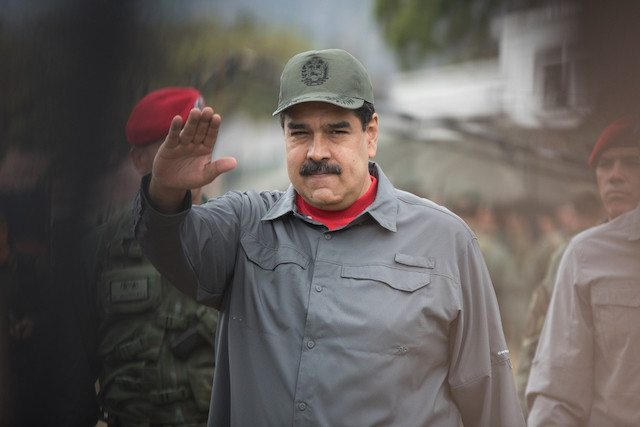Venezuela’s embattled president, Nicolás Maduro, and his inner circle could be granted an amnesty if he agrees to relinquish power and submit to a peaceful political transition, his opposition challenger Juan Guaidó has said.
In a high-stakes political gamble, Guaidó on Wednesday declared himself Venezuela’s legitimate interim president and was quickly recognised as such by powers including the United States, Brazil, Canada and Colombia.
On Thursday British foreign secretary, Jeremy Hunt, said his government believed Guaidó was “the right person to take Venezuela forward” but China, Russia and Turkey all backed Maduro, who claims he is the victim of a coup attempt masterminded by the US. The US state department has now urged US citizens to “strongly consider” leaving Venezuela and ordered out non-emergency government staff.
In his first interview since Wednesday’s dramatic declaration, Guaidó said he was determined to bring Maduro’s “dictatorship” to an end, stabilise his economically devastated nation and organise free elections “as soon as possible”.
The 35-year-old opposition leader renewed his call for Venezuela’s military – whose members have been offered an amnesty – to turn on their commander-in-chief.
He also indicated Maduro – who was sworn in for his second six-year term on 10 January despite a storm of international condemnation – could himself be offered an amnesty if he agreed to step aside. “This amnesty, these guarantees are on the table for everyone who is prepared to put themselves on the side of the constitution in order to recover the democratic order,” he said.
“In periods of transition similar things have happened [before],” Guaidó told the broadcaster Univisión, pointing to previous pardons in Chile and Venezuela in the 1970s and 1950s. “We cannot discount any element,” he added, insisting that such a move would not represent either impunity or forgetting.
Gringo plot
Maduro – who has vowed to resist what he calls a “gringo” plot to unseat him – has given little public hint he will accept such an offer although addressing the supreme court in Caracas on Thursday he insisted: “I’m ready for dialogue, for understanding, for negotation, for agreement.”
However, in the same speech Maduro also attacked Guaidó, accusing him of being a pawn in a US-backed plot to destroy the leftist Bolivarian revolution he inherited after Hugo Chávez’s death in 2013.
“Will we legitimise a puppet government imposed from abroad? We will allow our constitution to be violated … ? No!” said Maduro, blaming what he branded an attempted coup on Donald Trump’s “madness”.
Dialogue not war
Venezuela’s military top brass also threw their support behind Maduro with defence minister, Vladimir Padrino, warning the country could be plunged into a devastating conflict by Guaidó’s “laughable” but dangerous gambit. “It is not civil war, a war between brothers, that will solve the problems of Venezuela. It is dialogue,” Padrino said.
Venezuela expert Miguel Tinker Salas said he believed a negotiated solution – such as the one being promoted by the governments of Mexico and Uruguay – was the only way to defuse an increasingly perilous standoff that had the potential to escalate into a major geopolitical crisis between the US, Russia and China.
But Salas said widespread guarantees would have to be given to Maduro’s backers. “It’s not just about Maduro going into exile. What happens to all the chavistas?” We’re not talking about merely a couple of hundred people. We are talking about hundreds of thousands who have supported Chávez – and they are worried about retribution.”
In his interview, Guaidó insisted “nobody wanted” a foreign military intervention in Venezuela to remove Maduro and said he hoped a peaceful exit path could be found.
“We must not lose hope,” he said, urging supporters to continue taking to the streets to demand change.
By Tom Phillips
